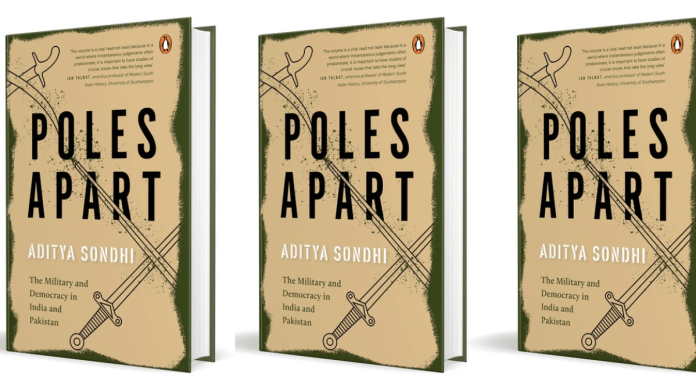Aditya Sondhi’s latest book, ‘Poles Apart: The Military and Democracy in India and Pakistan,’ offers a unique and original investigation into the comparative roles of the military in India and Pakistan and their influences on democratic growth in the two nations.
At the heart of Poles Apart lies a critical question: Why has India succeeded as a democracy while Pakistan has not? Many attribute the disparity to the omnipresence of the military in Pakistan’s political sphere. Sondhi delves deep into this phenomenon, explaining how the interventionist attitude of the Pakistani army has repeatedly disrupted its democratic processes. Conversely, the Indian military’s restraint and apolitical stance, despite numerous provocations, have often been overlooked or underappreciated.
Published by Penguin India, ‘Poles Apart’ will be released on 25 July on SoftCover, ThePrint’s online venue for launching non-fiction books.
The book meticulously documents several pivotal moments in the histories of both nations. In Pakistan, the authoritarian influences of Field Marshal Ayub Khan, General Yahya Khan, General Zia-ul-Haq, and General Pervez Musharraf are examined. These military leaders, through coups and direct governance, have profoundly shaped Pakistan’s political landscape, often at the expense of democratic institutions.
In contrast, India’s military has faced its own set of challenges. The 1962 defeat by China, the imposition of the Emergency in 1975, and Operation Blue Star in 1984 are explored as case studies. Despite these adversities, the Indian military remained committed to its apolitical ethos, a choice that has significantly contributed to the country’s democratic stability.
A notable addition to the book is a chapter on Bangladesh, which provides a comparative study of its own struggles with democracy and military rule. This inclusion enriches the narrative by offering insights into another South Asian nation’s attempt to balance military influence with democratic governance.
Sondhi, a senior advocate practising before the Supreme Court of India, holds a PhD from the University of Mysore. His thesis, “The Interface between the Army and Democracy: India and Pakistan Compared (1947-2008),” laid the groundwork for this book. Sondhi is also an accomplished author, with two previous non-fiction books published by Penguin India: *Unfinished Symphony* and *The Order of the Crest*. His interest in military history, Partition, and constitutionalism is well reflected in his writing.
The book has garnered praise from several notable figures. Admiral Arun Prakash (Retired), former chief of the Naval Staff, commends Sondhi’s thorough comparison of civil-military relationships in the subcontinent. He highlights the book’s exploration of how military encroachment into civilian spaces can influence a nation’s political destiny.
Hilal Ahmed, an associate professor at the Centre for the Study of Developing Societies (CSDS), praises ‘Poles Apart’ as a “fascinating comparative analysis” that offers crucial insights into the post-1947 evolution of the army in South Asia. He notes that the book is essential reading for anyone interested in comparative democracy, as it maps out the contrasting trajectories of democratic governance in India and Pakistan.
Also read: New book throws light on Kamal Haasan’s cinematic journey exploring his illustrious career






